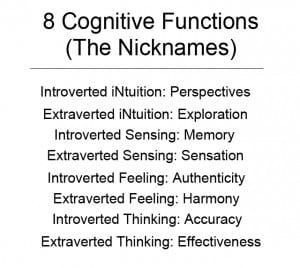 A word of warning: This post is primarily for Myers-Briggs and personality psychology geeks (of which I count myself one). If you’re new to personality types, this may or may not be interesting to you. Feel full permission to abort mission at any point.
A word of warning: This post is primarily for Myers-Briggs and personality psychology geeks (of which I count myself one). If you’re new to personality types, this may or may not be interesting to you. Feel full permission to abort mission at any point.
When I first started learning about personality types and, in particular, Myers-Briggs approximately 20 years ago (+/- a couple of years), the most accessible work on the subject was a book called “Please Understand Me” by the late David Keirsey.
It was pretty revolutionary for me, and started me on a path of obsession that I haven’t quite been able to shake two decades later. Very quickly I realized that the information was powerful, but it was also relatively limited. It was GREAT for understanding the 16 Myers-Briggs personality types, and I mastered those types as best I could.
I entered a space I see a LOT of people enter: I became an ‘expert’ at knowing people’s type descriptions and fancied myself an expert at being able to label others. It was a warm, self-satisfied place which gave me a sense of mastery and may or may not have prevented me from creating true intimacy with others. I vetted them based on the boxes I put them in, all the while thinking how awesome I was.
(Not everyone who learns personality types does this. My own personality type has a tendency to run to arrogance in any cognitive mastery, and I’ve had no choice but to let life beat the condescending asshole out of me. I’m a little spongy and bruised, but a much better person for it.)
At a certain point I started to abandon Myers-Briggs, realizing that my relationship with it wasn’t entirely healthy and I might be better off not typing other people, but just accepting them as they present.
Then I ran into another Myers-Briggs enthusiast and learned cognitive functions, and the world of typology burst open for me again. I became obsessed again, learned everything I could, did my own “think tanking” around the subject and once again gained a certain level of true mastery. But this time I wasn’t as arrogant overall, and I didn’t use it as a weapon to yield or a shield to hide behind.
I read everything I could, and of course – like you probably have – I started joining Myers-Briggs communities where everyone was using shorthand to reference cognitive functions and I felt ‘at home’.
Except, I wasn’t at home. In fact, in the course of a year I realized I HATED online forums around Myers-Briggs. Now, admittedly, as an ENTP I was on a lot of NT sites, which happen to be filled with the kind of arrogance that make a bad name for all NTs. The NF forums were a much softer place, often filled with bunnies and rainbows, and the occasional bouts of forum drama. But in comparison to the NT forum-style drama, still much closer to bunnies than, say, Howitzers.
ANYWAY.
To back up a little, there was a major barrier of entry when I graduated from standard, simple MBTI dichotomies (I/E, S/N, T/F, J/P) and into the cognitive functions. It didn’t take a super long time to realize that Introverts who are iNtuitive aren’t necessarily using Introverted Intuition, but it was still a bit of a challenge.
Now, I LOVE personality psychology, so the small barrier of entry wasn’t going to hold me back. But that’s not something I see playing out for everyone. In fact, that barrier of entry can trip people up pretty hardcore. I know people who have read “Gifts Differing” by Isabel Briggs-Myers and STILL don’t understand that she was talking about cognitive functions. As in, totally missed it.
While on the forums (that I came to hate), it became really obvious to me that crossing that barrier of entry was a sort of exclusive little club. As in, they didn’t want the masses to understand cog funcs, because otherwise they wouldn’t be able to stay exclusive in their knowledge. A knowledge, I suspect, that is weaponized more than it’s used as a tool for building up or a gift to give to the world.
So, when my previous business partner and I were talking about bringing this information to the masses we decided to just abandon that barrier of entry of confusion.
Why have someone say “Introvert Intuitives – they use Introverted Intuition, right?” and then have to respond with, “No, no, only if they’re Judgers, then they use Introverted Intuition. Otherwise they use Extraverted Intuition,” only to have them scratching their heads saying, “Huh?”
Why not just name them something else?
 Hence, the 8 nicknames were born.
Hence, the 8 nicknames were born.
No more confusion, no more head scratching, no more barrier of entry. No more conversations around “That doesn’t make sense, I should be using Introverted Intuition, I’m an INFP!” You’re an INFP, you use Exploration. And the response is, “Oh, okay. Cool.”
Thus, accessibility is born.
Second, why do we call it the Genius System?
As a Myers-Briggs enthusiast, I’m not sure if you’ve noticed, but a lot of people think they “know” Myers-Briggs.
“Oh, yeah, I had to take that personality test for my work one time. I’m an EPTF.”
If you say, “Yeah, that’s not how it works,” they already think they ‘know’ and their input mechanisms close down.
Just to be clear, I think personality psychology is one of the things that will save the world. Seriously. SAVE. THE. WORLD. There are a lot of people who are born leaders, born problem-solvers, born change agents who cloister themselves off from the world and lick the wounds called, “I’m not okay, I’m not good enough, nobody understands me.”
I think this is unconscionable, and it’s my mission to do everything possible to light these people up. To reverse the damage of “I’m not okay,” and reprogram the message, “I’m AMAZING and the world needs me.”
World hunger, war, pollution… all the biggies could be the focus of our attention if we weren’t focused on our personal wounds. If we’re happy, healthy, and coming from a place of psychological and emotional abundance, we can give back in a big way. And I personally believe understanding one’s personality type is a quick, leveraged first step in going, “Someone understands me? I’m actually part of a group of people like me? This isn’t ‘bad’, ‘wrong’ or ‘broken’, it’s just wiring?” And then BAM. The salve is on the wound, and the first steps toward solving major problems is taken. bitqt
If we can get people to re-evaluate their assumptions about a system that is becoming too easy to dismiss, if we can remove the barrier of entry to understanding something that could be a Game Changer for themselves and, potentially, the world, then we’ll call it Dr. Scholl’s Miracle Hair Ointment and Personality Salve.
Instead, of course, our marketing experience tells us to call it Genius Styles. Sometimes we call the cognitive functions ‘pillars’, sometimes ‘lenses’. It kind of depends upon the audience and what makes sense at the time. People like it, it makes them feel cool and special (our goal) and bonus: it’s true. Your primary and secondary cognitive functions ARE your genius, if you choose to development them, and so we have no problem stating them as such.
SO.
For you Myers-Briggs geeks (like me) that see something that feels amiss – you’re right. It IS amiss. But not to hornswaggle. To educate, to elucidate and, hopefully, to increase happiness for everyone who comes across the information.
Thanks for the question, Alexander! It was a GOOD one. 🙂
-Antonia
Want to learn more?
Discover Your Personal Genius
We want to hear from you. Leave your comments below…


Share:
Question from Podcast Listener: Is It Healthy to Personality Type Teenagers?
Personality Tools: Keirsey Four Temperaments vs. Carl Jung's Cognitive Functions
24 comments
Thanks, Tanja – You’ve just totally illustrated the point of the article. :)
MOST people feel the way you do, and so making sure we keep our information accessible to ALL types (whether they like nicknames about their type only or they’re so far ‘into it’ they like the abbreviations) is important.
Cheers!
A
It was all fun and games till u started using abbreviations, now I’m lost, bored and TMI. Sorry I dont put that much effort into much unless it keeps me entertained. Maybe break it up into dealing with each personality separately, because I really don’t care what is wrong with everyone else just wanted a short cut to answers not other peoples problems, lol. Thanks anyway, I see how your program works its just too much for me.
I would agree with Antonia’s post here. The MBTI receives a lot of negative feedback because it is “flawed.” While every psychological assessment can be “better,” I think it is important to consider that you have a flawed view of what the MBTI attempts to provide for the user. The MBTI was never meant to be taken without feedback from a qualified and knowledgeable professional of type theory. MBTI is a theoretical framework— it puts language to cognitions and functions we use in our lives. The MBTI does not aim to tell us “how much” of a particular function we are— Jung would cringe in his grave. Following this, the MBTI is not meant to deliver what the Big Five does. It does not MEASURE type, it instead INDICATES dominant preference. Being “thinking” does not mean that there is an absence of “feeling.” It simply states that the natural, instinctive reaction of a thinkers mindset is analysis and of thinking preference.
A fundamental tenet of type is that the user is the ultimate authority of their personality type. You do not get to choose it for them. Common knowledge in rhetoric and forensic debate also says that you do not get to discredit the system, and then attempt to evaluate the author on the said system. You removed any kind of ethos you may have had.
Type is meant to be used to describe a HEALTHY mental state and on individuals who are in a normal-functioning psychological state. You are not correct when saying that using one function actively suppresses the opposite. When you are conscious of your type preferences, and of the theory as a whole, you can utilize it as a toolbox—using each when most appropriate.
“In most cases this results from an unsatisfied need for emotional fulfillment which gives rise to a compensatory preference for thinking. Insistence on thinking implies a proud and rebellious demand for independence often seen in adolescents who want to break free from family and parental apron-strings.” <—- this is a load of garbage. I won't even respond. You know less than you think you do.
The highest honor. Cheers!
A
You have been deemed ‘authentic’ by the board of ENFP’s. :) GL with your endeavours in improving mankind!